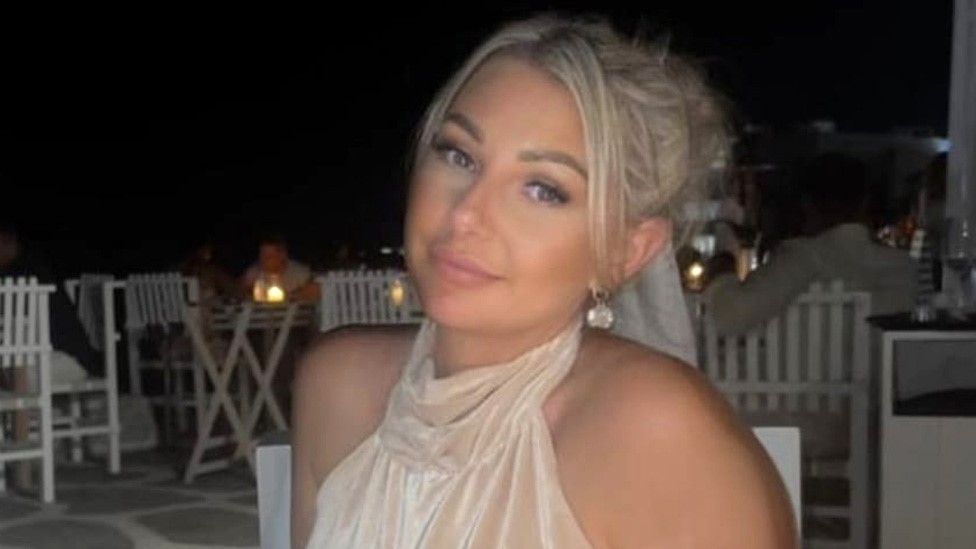16 minutes ago
About sharing
Customers of Smile Direct Club have told the BBC how they feel “left in the lurch”, “outraged” and “gutted” after the remote dentistry firm shut down.
Chantelle Jones, 32, paid a total of £1,800 to straighten her teeth before her wedding next year. While her top teeth had aligned, she was waiting for new moulds for her bottom teeth.
“I’m not sure if I’m going to get any money back,” she said.
Dentists have also expressed “great concern” for stranded patients.
Late on Friday, it emerged that a last-minute rescue attempt for Smile Direct Club had failed as the company was weighed down by debt.
“I found out in a TikTok video that they’d gone bankrupt. I think it’s an absolute disgrace how they have treated customers,” says Chantelle from Churchdown in Gloucestershire.
“The worst thing about it is… the app has not closed down but when I click on the chat button it’s not there. They seem completely uncontactable and I’m just left in the lurch.”
Oliver, a photographer from Kent, spent £799 with Smile Direct Club just under two weeks ago in the hope of straightening his smile.
“I’m gutted. It’s a fair chunk of money and I feel a bit numb about it really,” he says.
Founded in 2014, the orthodontics company styled itself as a disruptor to the “bricks-and-mortar” dental industry.
In traditional dentistry, “train-track” braces and clear aligners are fitted by dentists and orthodontists themselves, or a trained orthodontic therapist, after an in-person consultation.
Many customers were drawn to US-based Smile Direct Club because of lower prices, and the fact that they typically take the moulds for their aligners themselves at home.
The Nashville-based firm debuted on the Nasdaq stock exchange in 2019 and it was once valued at about $8.9bn (£7bn).
But it failed to turn a profit and in late September the firm filed for Chapter 11 bankruptcy protection in the US. At the time it had nearly $900m worth of debt, according to Fortune magazine.
And late on Friday the firm said it had made the “incredibly difficult decision to wind down its global operations”.
It said that any orders that have not yet been made or shipped have been cancelled, and apologised for any inconvenience caused. It recommended that if customers in the US, UK and elsewhere want to carry on with their treatment, they should get in touch with a local dentist.
There would be more information on refunds, it said, as the bankruptcy process determines next steps.
It has angered some customers, however, by saying that the “lifetime smile guarantee” it previously offered was no longer valid, while those with payment plans set up are expected to continue making payments.
Teah from the West Midlands told the BBC that she had paid a £135 deposit for her aligners about two weeks ago.
The treatment, which typically takes about four to six months, cost £1,739, which Teah was planning to pay back using the Smile Direct Club payment plan.
She says she feels “outraged and anxious” about the fact she is still being asked to make payments.
“It is not right that I [am expected to] pay such a large sum of money even though I didn’t receive any treatment or merchandise from them.”
The BBC has contacted Smile Direct Club for comment on Chantelle, Oliver and Teah’s experiences.
What should Smile Direct Club customers do?
Lisa Webb, consumer law expert at the organisation Which?, said that many customers would feel “adrift” due to the company going bust.
She pointed out that where refunds would be available, they will be handed by liquidators. “But customers will be at the back of a long queue of creditors so this is unlikely to amount to much, if anything at all,” she said.
She recommended that anyone in the UK who is still waiting for products, and has not had their order cancelled and paid via credit card, could also try to claim their money back via Section 75 under the Consumer Credit Act.
Dental bodies have also spoken out after the firm’s collapse.
The British Dental Association (BDA) said that it had raised concerns about the company offering plastic aligners remotely and the potential risk of misdiagnosis with regulators.
“Dentists are left to pick up the pieces when these providers offer wholly inappropriate treatment,” said BDA chair Eddie Crouch.
“It shouldn’t take a bankruptcy to protect patients from harm. It requires decent laws and effective regulation.”
And Anjli Patel of the British Orthodontic Society suggested that the firm was avoiding responsibility for customers’ treatment in a way that was “nothing short of scandalous”.
It is calling on watchdogs in the UK to ensure any firm providing orthodontics directly to patients in the UK are held to high standards.
Smile Direct Club vigorously defended its practices throughout and said consistently that customers’ treatments were reviewed by licensed professionals, while risks were listed as well.
In the statement on its website, the company said that it had “improved more than two million smiles and lives”.
But that is no consolation to those who now find themselves out of pocket with incomplete treatment.
Both Chantelle and Oliver regret being attracted by Smile Direct Club’s cheaper prices.
“I should have gone to my own dentist. Although it was more than double the amount of money – I was quoted £4,500 – I would have rather paid that looking back in hindsight,” says Chantelle.
Neither are hopeful of getting their retainers or their money back.
“I went cheap, and the whole phrase ‘buy cheap buy twice’ comes to mind,” says Oliver, adding that he was asking his bank for help and wanted to “fight his corner”.
Additional reporting by Emma Pengelly and Rozina Sini
Related Topics
20 January
